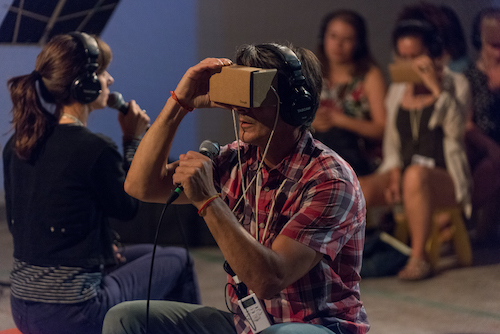 Café Sarajevo, by performance collective bluemouth inc., explores the concept of divided cities and the internal hatred that can lead to civil war. Playing at Progress Festival at The Theatre Centre, it follows the story of Lucy Simic and her partner Stephen O’Connell (of bluemouth), who travel to Simic’s father’s homeland of Bosnia to find out more about the ethnic conflict in the 1990s that tore the area apart.
Café Sarajevo, by performance collective bluemouth inc., explores the concept of divided cities and the internal hatred that can lead to civil war. Playing at Progress Festival at The Theatre Centre, it follows the story of Lucy Simic and her partner Stephen O’Connell (of bluemouth), who travel to Simic’s father’s homeland of Bosnia to find out more about the ethnic conflict in the 1990s that tore the area apart.
For our purposes, the conceit is that they’re recording a podcast, and we’re helping as both audience and participants. Audience members participate as people the couple met on their journey, and play an opening “scarcity” game as Team Chomsky vs. Team Foucault. As the journey to Sarajevo takes place, we move around the space, simulating a feeling of travel. We listen to everything on Bluetooth headphones with adjustable volume; instead of binoculars or a camera, we carry around our necks 360-degree VR glasses, so that we can literally follow in Simic and O’Connell’s footsteps.
The podcast aspect was a useful organizational device, and the immersive aspects (headed by creative technologist Jacob Niedzwiecki) were impressive and engaging, particularly the VR, which made the journey feel more immediate. Thought it was nice to walk around and to feel the temptation to dance to the music that was being played, the need to do so was almost negated by the VR glasses. It sometimes made me question why we were doing both.
Because the conceit of recording a podcast was so central, it becomes part of the story being told. Since the show is performed several times, its function is not to be a one-off recording of a brand-new podcast, but a part of a theatrical experience. Therefore, I found myself wanting to know more about the podcast creators and their motives, beyond their provision of a vehicle to share Simic’s story. One “behind the scenes” argument between the podcast team (Mariel Marshall and Peter Musante) about the politics of the situation provided some appealing tension, and I felt they could have explored this narrative avenue more fully.
Simic clearly feels a level of remove as a “war tourist,” despite her roots in the country. Her telling her story to the podcasters adds another level of remove, as does hearing it narrated in that very specific, NPR-style “podcast cadence” through headphones. Thus, while I genuinely enjoyed and appreciated the experience, for all its immersion, I still felt somewhat emotionally remote.
The show explores some interesting nuances of division, much of it having to do with language, music, and identity. A major realization of the loaded aspect of title comes to Simic when she commits the faux pas of calling Bosnian coffee “Turkish coffee,” and the experience came alive with a combination of VR and the actual making of coffee in the space, as some audience members sat on cushions around a blanket and partook. Simic also notices the nuances of how someone sings a patriotic song, and whether it signals community or danger.
I saw the play with a Serbian friend who immigrated to Canada in 1993 as a child due to the same conflict the play explores, who had a very mixed reaction to the experience. This wasn’t due to the politics, but due to what she felt was an unclear message and purpose for the show; the information felt relatively basic to her. She did, however, find Simic’s dancing very powerful, a warped version of a traditional dance serving as a symbol of the conflict she had in trying to “fit in” to a homeland that was not her home.
In that light, the show works more as Simic’s story than the story of the conflict, evoking that liminal feeling of homesickness for a place you’ve never been to. As a bit of a “war tourist” to the play myself, armed with only a cursory understanding of the war, my experience of the evening was quite different from that of someone who had lived it. I found much of the information to be new, welcome, and powerful.
However, I agreed with my guest that, with all the wonderful VR and podcasting, the music and dancing were still the most affecting pieces. Podcaster Marshall has a lovely voice, used touchingly on a Stabat Mater. As well, a moment where more pedestrian items were used to create the image of weapons was a reminder of the power in the simple and non-technological.
Café Sarajevo walks a fine line while telling its collection of stories. I always feel a little uncomfortable when anyone uses someone else’s tragedy to express how they now “truly understand the meaning of forgiveness.” But, I suppose, using other people’s stories to understand meaning is the purpose of theatre itself.
Details
- Café Sarajevo plays until February 2, 2020, at The Theatre Centre, Franco Boni Theatre (1115 Queen St. W.) as part of the Progress festival.
- Shows run Sunday at 2:00PM and 7:00PM.
- Tickets are $25 and can be purchased online, by calling 416-538-0988 or in person at the Theatre Box office.
Photo by Harry Chan
